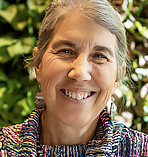G. K. Warren Prize

To get awards news straight to your inbox, make sure to sign up for our Connect with Awards newsletter.
About the G. K. Warren Prize
Awarded to recognize distinguished accomplishment in fluviatile geology and closely related aspects of the geological sciences. The recipient is awarded a $20,000 prize. Established through the G. K. Warren Fund by gift of Miss Emily B. Warren.
Most Recent Recipient
 |
Ellen E. Wohl, Colorado State University, will receive the 2024 G. K. Warren Prize.
Wohl’s expansive work has expanded our understanding of fundamental fluvial and watershed processes in diverse environments ranging from the Arctic to the tropics.
Award History
Previous recipients of the G. K. Warren Prize continue to achieve outstanding advancements in their fields. One recipient has been honored with a National Medal of Science.
Recipients:
Ellen E. Wohl (2024)
For her exceptional and far-reaching research and publication record that has expanded our understanding of fundamental fluvial and watershed processes in diverse environments ranging from the Arctic to the tropics, dramatically influenced and guided river management and restoration worldwide, and introduced broad audiences to the wonders of river science.
Read more about her work»
Anna K. Behrensmeyer (2019)
For her contributions to understanding fluvial processes, how they are expressed in the rock record, and how they shape our understanding of ecological change throughout the history of life on land.
Read more about Behrensmeyer's work»
Watch Behrensmeyer's acceptance speech»
Kelin X. Whipple (2014)
For his seminal studies on the role of fluvial incision as a key process that links climate, tectonics, and landscape evolution.
Watch Whipple's acceptance speech»
Alan D. Howard (2010)
For his seminal contributions on the theory of fluvial erosion, sedimentation, and landscape evolution.
Michael A. Church (2006)
For his extensive and innovative field and laboratory studies of the morphology and dynamics of natural and managed river channels at a range of scales
Gary Parker (2002)
For rigorous analysis based on fundamental physical principles and laboratory experiments markedly advancing our understanding of sediment transport, river morphology, and channel behavior.
Thomas Dunne (1998)
For his field observations as the basis for detailed theoretical analyses of many hydro-geomorphological problems, including surface erosion, snow-melt runoff, sediment budgets for small plots, and great rivers, including the Amazon.
Claudio Vita-Finzi (1994)
For his distinguished contributions to fluvial morphology in relation to climate, tectonic activity, and human history (archaeological geology), on the basis of field investigations on several continents.
John R. L. Allen (1990)
For his distinguished contributions to fluvial sedimentology and paleogeomorphology, which skillfully blends field studies of modern and ancient fluvial environments with laboratory experiments and mathematical modeling.
Stanley A. Schumm (1986)
For his sound, insightful contributions to the role of fluvial processes in the evolution of slopes, stream channels, and sediment production, and their practical concerns to man.
John T. Hack (1982)
For his major contributions to understanding of form and characteristics of river channels as related to geologic stratigraphy.
Walter B. Langbein (1976)
For his significant advancement of hydrology and fluviatile geology through geophysics and mathematics.
Luna B. Leopold (1973)
For his contributions to the field of hydraulic geometry of rivers and his studies of the riverine environment.
Ralph A. Bagnold (1969)
For his outstanding contributions in fluvial geology.

